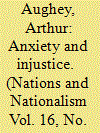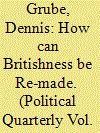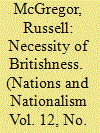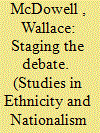| Srl | Item |
| 1 |
ID:
098151


|
|
|
|
|
| Publication |
2010.
|
| Summary/Abstract |
An explicit and politically mobilised English nationalism has been remarkable because of its absence from deliberation on constitutional change in the United Kingdom. In short, it remains a mood and not a movement. This article explores the mood and explains why that mood has not become, as yet, a movement. It examines three related aspects of the English nationalist mood. First, it considers anxieties about the condition of contemporary England which can be found in the work of intellectuals and artists. Second, it identifies the sense of injustice which animates the lobby group the Campaign for an English Parliament. Finally, it looks at how mainstream party politics responds to these national anxieties and that sense of national injustice.
|
|
|
|
|
|
|
|
|
|
|
|
|
|
|
|
| 2 |
ID:
117494


|
|
|
|
|
| Publication |
2012.
|
| Summary/Abstract |
Immigration presents a daunting challenge to successive British governments. The public ranks immigration as one of the leading policy issues after the economy and employment. There is also greater public support for stronger immigration controls than in many other countries. In response, government strategy has included the use of a citizenship test. While the citizenship test is widely acknowledged as one key part of immigration policy, the test has received surprisingly little critical analysis. This article is an attempt to bring greater attention to serious problems with the current test and to offer three recommendations for its revision and reform. First, there is a need to revise and update the citizenship test. Secondly, there is a need to expand the test to include questions about British history and basic law. The third recommendation is more wide-ranging: it is that we reconsider what we expect new citizens to know more broadly. The citizenship test should not be viewed as a barrier, but as a bridge. The focus should centre on what future citizens should be expected to know rather than how others might be excluded. The test should ensure that future citizens are suitably prepared for citizenship. There is an urgent need to improve the test and this should not be an opportunity wasted for the benefit of both citizens and future citizens alike.
|
|
|
|
|
|
|
|
|
|
|
|
|
|
|
|
| 3 |
ID:
108319


|
|
|
|
|
| Publication |
2011.
|
| Summary/Abstract |
Modern Britishness is widely seen to be based on shared values like 'fair play', 'tolerance', and respect for 'diversity'. Can such a 'values-based Britishness' be effective as a national binding agent in an era of devolution and globalisation? The idea that a uniquely 'British' character is based on shared values of some kind is not new. The contemporary debate is framed by decisions made over a century ago in the Victorian era-when the decisive shift occurred from a British identity based on religious difference to one based on shared moral values. Through political rhetoric, legislation, and the courts, Victorian governments shaped and changed the character of Britishness. The same tools remain available to contemporary lawmakers in shaping a twenty-first century Britishness that embraces modern universal values, but also defines some more uniquely British emotional connection points around which national identity can be built.
|
|
|
|
|
|
|
|
|
|
|
|
|
|
|
|
| 4 |
ID:
071644


|
|
|
|
|
| Publication |
2006.
|
| Summary/Abstract |
Until the last third of the twentieth century, Britishness figured prominently in the national identity of Australians. Many scholars of Australian nationalism have assumed an inherent antipathy between British and Australian solidarities; others have appreciated that there was a degree of mutuality between the two; few have explained why. This article offers such an explanation. It focuses on the crucial nation-building period twenty years on either side of the federation of the Australian colonies in 1901. Drawing on ethno-symbolist approaches to nationalism, it argues that Britishness provided the necessary ethno-cultural foundations for Australian nationhood, the only available repertoire of myth and symbol that could fulfil the nationalist aspiration for unity. Yet Britishness in the antipodes was significantly different to that of the British Isles, as were the civic/territorial components of Australian conceptions of nationhood, giving rise to a distinctive British-Australian composite nationalism.
|
|
|
|
|
|
|
|
|
|
|
|
|
|
|
|
| 5 |
ID:
088849


|
|
|
|
|
| Publication |
2009.
|
| Summary/Abstract |
This paper, which emanates from the field of theatre studies, examines plays written by Belfast writer Gary Mitchell in and around the time of the Good Friday (Belfast) Agreement of 1998. Mitchell occupies a unique position in Irish theatre, being the first playwright to emerge from and offer a dramatic critique of paramilitary-dominated Loyalist communities. Central to the paper is the argument that Mitchell offers a set of important insights into how such communities reflect academic debates around masculinities, imagined national communities and the relationship between masculinity and violence. The paper looks at three plays which received premieres around the time of the Belfast agreement and utilises the theoretical approaches offered by proponents of hegemonic masculinity as well as post-Foucauldian thinkers
|
|
|
|
|
|
|
|
|
|
|
|
|
|
|
|